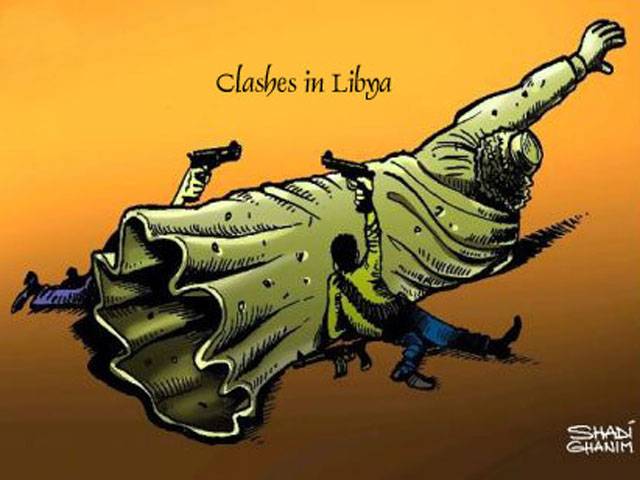As Arab revolts began last year, it was inevitable that people would compare them to the collapse of communism in Eastern Europe.
And that comparison suggests that the emancipation of Arab societies will likely stumble on the matter of memory, as did the former communist societies.
A useful keyhole into that recent past is a Pulitzer Prize-winning 1995 book by Tina Rosenberg, The Haunted Land: Facing Europe’s Ghosts After Communism.Ms Rosenberg focused on three countries; Czechoslovakia (before its break-up into two states), Poland, and the German Democratic Republic. She examined how each came to terms with its oppressive communist legacy, and concluded that the process in each country was wanting, causing discord rather than the desirable closure initially anticipated.
In Czechoslovakia, the post-communist establishment introduced what came to be called “lustrace”, a mechanism to uncover who had collaborated with the secret service, the StB, while barring those who had from certain types of positions. The difficulty was that the names of alleged collaborators were taken from the StB registry that indexed folders on the individuals. Being named in the registry automatically implied guilt, although there were myriad other reasons why someone might be listed. Over time, lustrace came to be regarded as indiscriminate, provoking growing condemnation.
In Poland the situation was different. There was no broad organised purge of communists. Rather, the focus was on whether the former Polish leader, Wojciech Jaruzelski, and members of his Council of State, had committed treason by introducing martial law under Soviet duress in December 1981. The inquiry, by a parliamentary committee, debated whether Mr Jaruzelski and his ministers should be referred to the State Tribunal. Ultimately, the committee decided not.
The process was undermined by its haphazard nature. Mr Jaruzelski argued that he had been forced to impose martial law to avert a Soviet invasion. That was not quite true, but there was also no agreement in Poland over how to deal with the communist legacy. Even Adam Michnik, a dissident targeted by the communists, defended Mr Jaruzelski, arguing that reconciliation was necessary.
In East Germany, a third approach was tried; opening the files of the secret police, the Stasi, to the victims. This way individuals could determine who had informed on them, and what had been known of their activities.
The post-unification German authorities also tried East German officials, as well as some border guards who had killed people trying to escape. This proved less successful, partly because it required proving that the accused had acted illegally under East German law, no easy task.
Each experience reaffirmed that societies going through momentous change often reach no consensus over settling past accounts.
This will prove even more challenging in the Arab world, where political transitions have tended to be violent and divisive.
In Egypt, for instance, the military allowed Hosni Mubarak to be put on trial. However, the potential benefits of the decision were soon neutralised by conflict, as supporters and enemies of the former president fought around the courtroom. Instead of being turned into an institutional means to dismantle the old order, the trial was closed to the public, amid a clear lack of enthusiasm by the military. After all, Mr Mubarak’s trial is also that of the security institutions that bolstered his rule, led by the army.
In Libya, the post-war divisions render unlikely a harmonious consideration of the Gaddafi regime’s ills. Muammar Gaddafi’s killing eliminated prospects for a trial that could have united Libyans against the old leadership. Seif Al Islam Gaddafi is in custody, but pervasive factionalism may mean he becomes a political football rather than an instrument to wash away a sordid past.
In Yemen, the regime that brutally repressed dissent may enjoy impunity, because the Gulf plan to remove President Ali Abdullah Saleh effectively exonerates him. That may be reversed one day, but dissension in the country and the breakdown of government authority, which was never strong in the first place, makes a concerted reckoning with the past almost impossible.
And in Syria, too much remains indeterminate to contemplate the issue of memory. Syrians would find much to deconstruct, literally, after 40 years of Assad rule, but the society is complex. A desire to avert disputes may favour a comprehensive reconciliation, once a handful of individuals are punished.
Two Arab countries that did have an opportunity to engage memory are Lebanon and Iraq. After the Lebanese civil war ended in 1990, the government issued a blanket pardon for wartime crimes. Post-war reconstruction was advanced on a foundation of officially-sanctioned amnesia. Few Lebanese challenged this because most communal leaders, therefore their leaders, were culpable.
In Iraq, the trial of Saddam Hussein was widely interpreted as a last opportunity to part the curtain on Baath-era crimes.
Sunnis saw the trial merely as another facet of their communal marginalisation, while many Shiites viewed it as an expedient occasion to get rid of a once-feared man.
In times like this, it’s worth rereading Ms Rosenberg. There are no easy paths to national self-reflection, especially when this involves confronting one’s own misdeeds, which only rarely can be fully separated from the misdeeds of overthrown rulers. Guilt has a way of touching everything. That is why societies in democratic or peaceful transitions will often prefer to forget, and to forgive the unforgivable.
Michael Young is opinion editor of the Daily Star newspaper in Beirut and author of The Ghosts of Martyrs Square: An Eyewitness Account of Lebanon’s Life Struggle. –The National
Saturday, April 20, 2024
It’s always difficult to reach post-revolutionary closure

Policitising Tragedy
April 20, 2024
Tehran to Rafah
April 20, 2024
A New Leaf
April 20, 2024
A Tense Neighbourhood
April 19, 2024
Dubai Underwater
April 19, 2024
Dangers of Deepfakes
April 20, 2024
Feudalism
April 20, 2024
Kite tragedy
April 19, 2024
Discipline dilemma
April 19, 2024
Urgent plea
April 19, 2024
ePaper - Nawaiwaqt
Advertisement
Nawaiwaqt Group | Copyright © 2024





